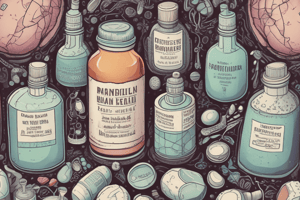Podcast
Questions and Answers
What does the term antibiotics literally mean?
What does the term antibiotics literally mean?
- Against life (correct)
- Against bacteria
- Against viruses
- Against the body
Which type of antibiotic is effective against many organisms?
Which type of antibiotic is effective against many organisms?
- Selective antibiotics
- Broad-spectrum antibiotics (correct)
- Targeted antibiotics
- Narrow-spectrum antibiotics
Why may a pediatrician decide not to prescribe antibiotics for a child's illness?
Why may a pediatrician decide not to prescribe antibiotics for a child's illness?
- Symptoms may not require them. (correct)
- Antibiotics are too expensive.
- Children are not allowed to take them.
- Antibiotics are always effective.
What may happen if antibiotics are used unnecessarily or taken incorrectly?
What may happen if antibiotics are used unnecessarily or taken incorrectly?
Which class of drugs do antibacterials fall under?
Which class of drugs do antibacterials fall under?
How have childhood vaccinations impacted serious diseases?
How have childhood vaccinations impacted serious diseases?
What reflects the potential downside of antibiotic usage?
What reflects the potential downside of antibiotic usage?
What is one of the most significant medical achievements of the 20th century?
What is one of the most significant medical achievements of the 20th century?
What significant problem arose shortly after the introduction of penicillin?
What significant problem arose shortly after the introduction of penicillin?
Which statement accurately describes the role of penicillin after its discovery?
Which statement accurately describes the role of penicillin after its discovery?
What did Alexander Fleming observe in his laboratory in 1928 that led to the discovery of penicillin?
What did Alexander Fleming observe in his laboratory in 1928 that led to the discovery of penicillin?
Why did many physicians change their prescribing habits in the 1990s regarding antibiotics for children?
Why did many physicians change their prescribing habits in the 1990s regarding antibiotics for children?
Which of the following bacteria was found to be resistant to penicillin shortly after its introduction?
Which of the following bacteria was found to be resistant to penicillin shortly after its introduction?
What was the main consequence of widespread antibiotic use observed in children during the late 1990s?
What was the main consequence of widespread antibiotic use observed in children during the late 1990s?
Before the advent of antibiotics, which condition had notably high mortality rates among children?
Before the advent of antibiotics, which condition had notably high mortality rates among children?
Flashcards
Antibiotics
Antibiotics
Drugs that fight microbes, including bacteria, viruses, fungi, and parasites.
Broad-spectrum antibiotics
Broad-spectrum antibiotics
Antibiotics effective against many different types of microbes.
Narrow-spectrum antibiotics
Narrow-spectrum antibiotics
Antibiotics effective against only a few types of microbes.
Antibacterials
Antibacterials
Signup and view all the flashcards
Antibiotic overuse
Antibiotic overuse
Signup and view all the flashcards
Antimicrobial drugs
Antimicrobial drugs
Signup and view all the flashcards
Antibiotics Importance
Antibiotics Importance
Signup and view all the flashcards
Antibiotic Necessity
Antibiotic Necessity
Signup and view all the flashcards
Antibiotic Era's Impact
Antibiotic Era's Impact
Signup and view all the flashcards
Penicillin Discovery
Penicillin Discovery
Signup and view all the flashcards
Antibiotic Resistance
Antibiotic Resistance
Signup and view all the flashcards
Pre-Antibiotic Era
Pre-Antibiotic Era
Signup and view all the flashcards
Antibiotics' Use in War
Antibiotics' Use in War
Signup and view all the flashcards
Antibiotic Prescriptions
Antibiotic Prescriptions
Signup and view all the flashcards
Careful Antibiotic Use
Careful Antibiotic Use
Signup and view all the flashcards
Study Notes
Antibiotics: History and Use
- Antibiotics are medications that fight microbes, including bacteria, viruses, fungi, and parasites.
- Broad-spectrum antibiotics work against many types of microbes, while narrow-spectrum antibiotics target a few.
- Antibacterials are the most common antibiotic type. Examples include ampicillin and penicillin.
Importance of Careful Use
- Antibiotics have significantly reduced illness and death from serious diseases, like meningitis, strep throat, and ear infections.
- Prior to antibiotics, these diseases often caused severe complications or death.
- Overuse and inappropriate use of antibiotics can lead to antibiotic resistance, diminishing their effectiveness.
Discovering Penicillin
- Alexander Fleming discovered penicillin inadvertently in 1928.
- He noticed that mold prevented bacterial growth on a petri dish.
- Penicillin's ability to kill bacteria was explored by researchers and tested on humans starting in 1941.
- It proved highly effective in treating bacterial infections.
- Its discovery won Fleming a Nobel Prize.
The Antibiotic Era
- Penicillin's success spurred further antibiotic development.
- Many types of antibiotics are now available.
- Millions of antibiotic prescriptions are written annually in the U.S., many for children.
Challenges with Antibiotics
- Antibiotic resistance is a growing problem.
- Some bacteria now resist penicillin and other antibiotics.
- Resistance makes some infections harder to treat, potentially requiring multiple antibiotic treatments.
- Doctors now carefully prescribe antibiotics to lessen resistance.
- Surveys show a drop in antibiotic prescriptions for common childhood respiratory infections.
Important Note
- Antibiotics should only be used as directed by a doctor.
- Following medical guidelines helps preserve their effectiveness in the longer term.
Studying That Suits You
Use AI to generate personalized quizzes and flashcards to suit your learning preferences.




